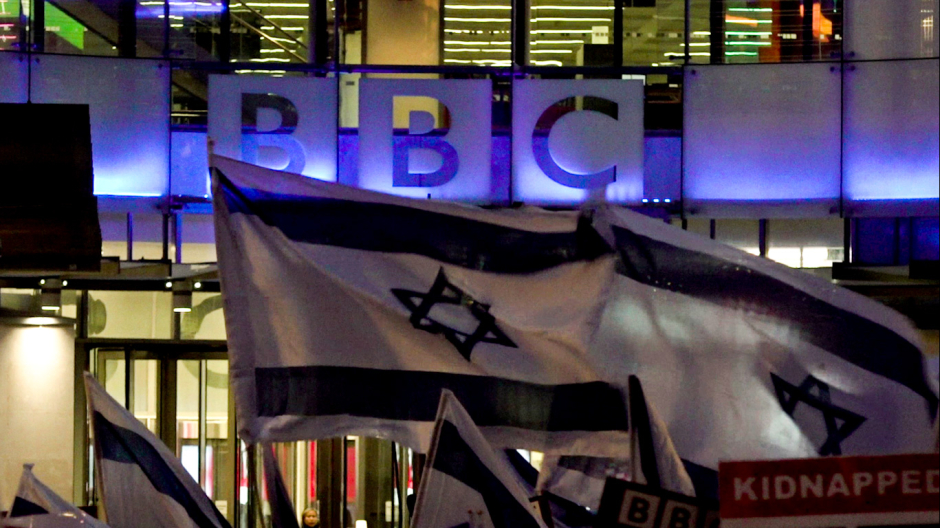Since the beginning of the war on Gaza, the British Broadcasting Corporation (BBC) has faced repeated accusations of pro-Israel bias, not only from the public but also internally. On July 16 and 18, leaked emails between BBC staff highlighted the extent of these grievances, accusing the outlet of complicity in the ongoing genocide in Gaza.
Jadaliyya, an independent magazine by the Arab Studies Institute, obtained leaked emails from May between Beirut-based BBC correspondent Rami Ruhayem and BBC Director General Tim Davie. Ruhayem also sent these emails to several BBC News departments. The emails and attachments detail instances where the BBC missed key context, allowed guests to make unsubstantiated claims, and provided "evidence of a collapse in the application of basic standards and norms of journalism that seems aligned with Israel's propaganda strategy."
While Ruhayem detailed various pieces of evidence, he highlighted the BBC's response to a prominent atrocity propaganda story spread on-air four times:
A guest on the BBC stated: "... just yesterday I heard one of the women that was pregnant there, this terrorist put his hand in, took out her foetus killed it while the umbilical cord was still attached to her..." The presenter let the claim pass without making any inquiries.
Days later, another guest said: "...they pulled a baby out of a pregnant mom and then beheaded the baby, beheaded the mom." This, too, passed without any inquiry by the presenter.
Days later, the guest again stated: "... we now know that there was a pregnant woman who had her belly cut open, the baby was removed from her stomach and beheaded in front of her. There's videos of this."
The BBC presenter responded: "Which is unverified, we haven't seen these videos."
The guest replied, "You haven't seen it. I know many people who have seen it. These videos are in existence, there's countless others..."
In relative terms, this much-needed interjection is a credit to the individual presenter. However, it is also a de facto confession by the BBC that the outlet had allowed this claim to be made at least twice without question despite it being unverified. It would have been reasonable for audiences exposed to the previous two interviews, especially those who trust the BBC, to assume the BBC believes this event occurred.
The leaked emails are not the only evidence of the BBC's bias or its staff's grievances. Two separate studies, published by Pulitzer Prize-winning journalist Mona Chalabi, examined the BBC's bias in mentioning Palestinian and Israeli deaths and the language used to describe Palestinians and Israelis. The analysis by Dana Najjar and Jan Lietava reviewed 600 articles and 4,000 live feed posts on the BBC website between October 7, 2023, and December 2, 2023.
Commenting on the research, Chalabi stated: "This summary doesn't fully capture all the dehumanization often present in journalism language. For example, Palestinian deaths are frequently mentioned in the context of vengeance ('retaliation'/'retaliatory'/'retaliated' appear 190 times in this dataset) and, unlike Israeli deaths/hostages, these victims are rarely mentioned by name."
In November of last year, eight UK-based journalists working for the BBC wrote a 2,300-word letter to Al Jazeera, highlighting a "double standard in how civilians are seen" in Gaza compared to the "unflinching" coverage of Russia's actions in Ukraine. Then, in January, the BBC acknowledged what it termed a possible mistake in its reporting on the International Court of Justice (ICJ) trial accusing Israel of genocide in Gaza. While broadcasting the second day of live public hearings in full, where Israel's lawyers made their counterclaims, the BBC only partially aired the first day, which featured South Africa's legal team arguing that Israel violated the genocide convention.
Earlier this month, the BBC ran a headline about the murder of a young Palestinian man with Down's Syndrome, reading "The lonely death of Gaza man with Down's syndrome." The article didn't mention until paragraph 16 that Israeli soldiers set attack dogs on him. Following a public uproar, the BBC changed the headline to "Gaza man with Down's syndrome attacked by IDF dog and left to die, mother says."
Despite the United Nations and leading human rights groups trusting the Gaza Health Ministry's statistics due to their long track record of reliability, the BBC continues to label it "Hamas-run" in its footage. On July 14, when over 140 Palestinians were killed by Israel in Gaza, the BBC published a headline reading, "Hamas-run health ministry says 141 killed in Israeli strikes." Although the Gaza Health Ministry's casualty figures have consistently correlated with Israel's in past conflicts, the BBC's headline implies that the reader should dismiss the death toll figure as Hamas propaganda. Under British law, Hamas is considered a terrorist organization, so the headline suggests that a terrorist-run ministry is making a claim, despite no evidence of Hamas influencing the data or the civilian-run Health Ministry being operated by armed fighters.
Feature photo |A video grab of protesters outside BBC Broadcasting House, London, October 16, 2023. Photo |AP
Robert Inlakesh is a political analyst, journalist and documentary filmmaker currently based in London, UK. He has reported from and lived in the occupied Palestinian territories and hosts the show 'Palestine Files'. Director of 'Steal of the Century: Trump's Palestine-Israel Catastrophe'. Follow him on Twitter @falasteen47
